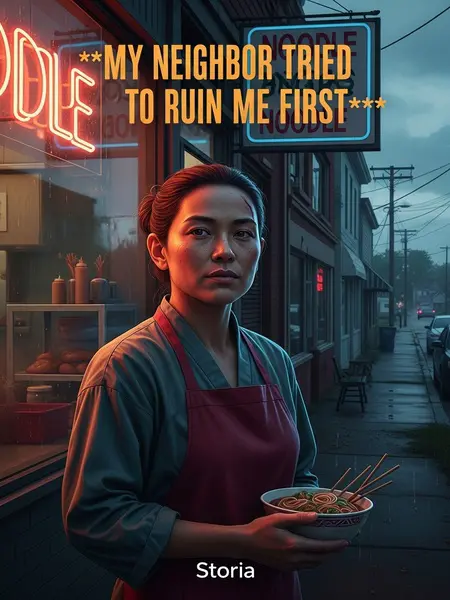Chapter 1: Fireworks and Finger-Pointing
I heard that the elderly couple next door—the ones who ran the braised meats deli—had been killed, right there in their own shop. I mean, murdered. In our quiet town, that just doesn’t happen. I remember standing there, staring at their storefront, thinking: No way. Not here. Not them. It felt unreal, like something out of a Dateline episode, except it was Main Street, and I knew the victims.
The news hit the town like a thunderclap. The yellow police tape was still flapping in the muggy dawn breeze, and squad cars blocked off the sidewalk, their lights swirling in the early morning before the sun was even up. I remember thinking: this can’t be real. Even though the official word hadn’t come down yet, people were already whispering in the diner booths and out on the sidewalk in front of the shops. It felt like we’d all been dropped into the middle of a true crime podcast—only this time, it was happening right next door.
Honestly, I was so thrilled I went out and bought fireworks. I know it sounds twisted, but I couldn’t help myself. I lit them off in the street to celebrate, sparks fizzing and popping in the night air.
I know, it sounds crazy. But I was grinning ear to ear as I watched the sparks burst over Main Street. Relief. And, yeah, a little vindictive joy. My hands shook as I lit the fuses, the cheap cardboard tubes hissing and popping against the night sky. For the first time in months, I felt like I could finally breathe again.
The cops hadn’t even released a statement yet, but the local precinct picked me up. I gotta admit, I didn’t see that coming. One minute I’m sweeping up firework debris, the next I’m in the back of a squad car.
They showed up before sunrise, their boots crunching on the gravel outside my shop. I barely had time to change out of my pajamas before they hauled me down to the station. Guess they had bigger things on their minds. They didn’t ask much about the fireworks—just looked at me like I was trouble and told me to sit tight.
They said I’d endangered public safety, slapped me with a $75 fine, and gave me fifteen days in the county lockup. Fifteen days. Not exactly a slap on the wrist.
Fifteen days felt like a lifetime in the holding cell. The walls were painted a dull gray, and the cot smelled faintly of bleach and sweat. I paid the fine, signed the paperwork, and counted the hours until I could get back to my place. The whole time, I kept thinking: was it worth it? Still, I told myself: totally worth it.
Before all this, my life was pretty simple. I run a little restaurant, mainly serving our town’s famous jiggly noodle bowls.
It’s nothing fancy—just a narrow storefront with a neon sign and a row of battered stools at the counter. The windows fog up every morning from the steam, and you can smell the garlic from halfway down the block. Folks know me for my noodles. Some regulars say they can’t start their day without a bowl from my place.
Big portions, filling, dirt cheap. What more could you want?
You walk in hungry, you walk out stuffed. That’s the promise. Nobody leaves hungry. Not on my watch. My portions are so generous the bowls practically overflow, and nobody leaves without loosening their belt a notch. I’ve always believed good food should be affordable for everyone, not just a luxury for the few.
And since it’s a local staple, there are more than a dozen joints up and down Main Street hawking their own take on jiggly noodles.
It’s like a little noodle alley—every block has at least one shop, and the air always smells faintly of simmering broth. You could walk from the courthouse to the river and pass at least a dozen places, each one swearing their recipe is the real deal. Everyone’s got their own secret, or so they claim.
But there’s no cutthroat rivalry—after all, a giant bowl’s only three bucks. It’s all about volume. I remember one time, we all pitched in for a block party and shared ingredients. That’s just how it is.
We’re not talking five-star dining or Michelin stars here. It’s Main Street, not Manhattan. People want a hot meal that won’t break the bank. The competition’s friendly, more like a family feud than a business war. Sometimes we even borrow sugar or eggs from each other if we run out.
Business is good or bad depending on who’s got the best flavor. That’s just the way it goes. Get the seasoning right, and you’re golden. Mess it up, and you’ll hear about it from everyone in town.
But I’ve got a secret recipe, and business is booming. No kidding, hundreds. I can move hundreds of bowls a day.
My grandma taught me the recipe—she called it her ‘Sunday Special.’ There’s a little trick to the broth, a certain blend of spices you can’t buy at the store. I guard that secret like it’s my grandma’s wedding ring—locked up tight. Every morning, I get up before dawn to prep, and by lunchtime, I’m ladling out bowls as fast as my hands can move.
Next door to me is an older couple—Hank and Betty. They’re in their sixties. They run a braised meats counter. Their place smells like smoked sausage and old coffee.
Their shop’s been around forever—red-and-white checked curtains, faded photos on the wall from county fairs back in the ‘80s. Hank wears his baseball cap backwards, Betty’s always got a cigarette dangling from her lips, and together they run the only old-school deli on the block. They’re as much a fixture of Main Street as the lampposts.
Some folks like to pair their noodles with sausage, pickled eggs, head cheese, pig ears, beef tendon, and other deli meats. I remember a regular who swore by the combo—said it was the only way to eat noodles.
It’s a tradition around here—noodle bowl in one hand, plate of salty, smoky meats in the other. High school kids, construction workers, even the mayor drops by sometimes for a combo. There’s something about the mix that just feels right, like sweet tea with barbecue. Can’t have one without the other, right?
So when I first opened, mostly just to keep the peace, I bought meats from them, doctored them up, and sold them in my own place.
It started as a handshake deal. I’d swing by their counter in the morning, grab a tray of sliced sausage and eggs, and bring them back to my kitchen. I’d jazz them up with a little extra seasoning, maybe some fresh scallions, and serve them alongside my noodles. It was easy, and it kept things friendly. That’s how neighbors should be, I thought.
Everything was fine at first.
We’d nod to each other in the mornings, share a laugh over coffee, and even swapped recipes now and then. I remember Hank giving me a tip on how to cure pig’s ear just right. For a while, it felt like we were part of the same team, just trying to make a living in a small town.
Until Hank and Betty found out I was reselling their meats at double the price, and they got real salty. Man, you could feel the air change.
Word must’ve gotten around—maybe a customer mentioned my prices, or maybe they just peeked at my menu. Either way, they started giving me the cold shoulder. Betty stopped smiling, and Hank’s jokes dried up. You could feel the tension simmering just under the surface. It was like a storm was coming.
First, Hank came over to talk, wanting to lay down some ground rules. From then on, anyone who came in for noodles should buy deli meats straight from them.
He ambled in one afternoon, wiped his hands on his apron, and leaned on my counter like we were old buddies. “Listen,” he said, “why don’t we help each other out? You’ve got the crowd, I’ve got the meats. Let’s make it official.”
Hank said, “Your place is hopping, you can barely keep up with the noodles. Just drop the meats. If anyone wants ‘em, send them over to me. Save yourself the hassle. I’ll even bump up the price a bit, and when I make a killing, drinks are on me.”
He grinned, trying to sweeten the deal. “Come on, it’s a win-win. You focus on noodles, I take care of the rest. After hours, we’ll grab a beer at O’Malley’s and celebrate.” But I could see the edge in his eyes—this wasn’t just friendly advice. He wanted the business, plain and simple. I could feel my jaw clench.













